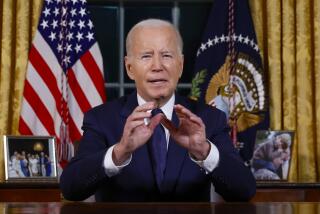Florida Sees Domestic Issues as Foreign Affairs
- Share via
MIAMI — For Florida officials, the picture of Bennette Dorsonne’s body sprawled dead in the surf explains with tragic eloquence just why foreign policy is too important to be left to the federal government alone.
“This is wrenching,” said Mark Schlakman, special counsel to Democratic Gov. Lawton Chiles, reacting to the photograph published on the front page of several Florida newspapers this week. Dorsonne, 24, a Haitian attempting to join relatives in South Florida, drowned Monday after leaping from a smuggler’s boat offshore near Palm Beach.
“When desperation reaches the point where people put themselves in this kind of jeopardy, it’s clear that we have to deal with the problems in those countries,” Schlakman said. “To the extent that Florida can make a difference, we should.”
In the last two years, Florida has launched an ambitious program of “preventive diplomacy” to address the problems of political and economic turmoil that in recent years have flooded the state with refugees--chiefly from Haiti and Cuba. “We have a foreign policy, and we are aggressively pursuing it,” Lt. Gov. Buddy McKay said.
In Haiti, for example, the state is training health care workers, rebuilding hospitals, forging U.S. business links and soliciting private aid. Through its Florida/Haiti Initiative, Florida spends $250,000 a year trying to boost the quality of life in that impoverished nation and encourage Haitians to stay home.
But Haiti is not Florida’s only Caribbean outreach project. Through its domestic peace corps, the Florida International Volunteer Corps, the state has provided expertise to about 20 nations in the region. Since 1982, more than 600 volunteers have taught beekeeping in Dominica and St. Lucia, helped improve poultry production in Antigua, advised on pig farming in Belize and set up youth camps in Honduras, among other projects.
“We can go into communities in these countries and ask, ‘What do you really need?’ ” said volunteer corps President David A. Pasquarelli, who oversees an annual budget of $700,000. For example, he said, “we’ve gotten more than 1,400 young people involved in 4-H clubs in Grenada.”
Through the state comptroller’s office, Florida also has sent banking experts to work with the governments of Trinidad and Tobago, Barbados, Bermuda and others on ways to halt laundering of drug money.
Although Chiles often has accused the federal government of doing too little to prevent migratory waves from washing over Florida, the state is not attempting to usurp federal powers, Schlakman said. “Can Florida fix Haiti? No. But failing to try means that we are just responding to crises.”
A look at the map makes evident Florida’s position as both a U.S. and a Caribbean state, closer to the capitals of 16 nations in the region than it is to Washington, D.C. When revolution, repression or economic disaster strikes in nations to the south, Florida regularly catches the fallout.
Although critics suggest that the state’s efforts to conduct its own foreign policy are ineffectual or inappropriate, the Chiles administration has opted for any measures designed to head off anti-immigrant policies, such as California Propositions 187 and 209, Schlakman said.
And other states are taking notice. “Florida has figured out some of the things you can do to deal with domestic issues without undercutting international cooperation,” said political scientist Abraham F. Lowenthal, a professor at USC and president of the Pacific Council on International Policy.
“California has not done that, to my knowledge. Propositions 187 and 209 are attempts to deal with aspects of the immigration issue but in ways which infuriate the Mexicans. That impedes cooperation.”
Refugees from Haiti and Cuba continue to illegally enter the U.S. through Florida, although at a lower rate than in some previous years. After the raft crisis of 1994, when 32,000 Cubans sailed to Florida on makeshift vessels, the United States struck a deal through which migrants stopped at sea can be repatriated to Cuba.
But lacking normal relations with communist Cuba, neither the federal government nor Florida can exercise much influence on domestic policies or conditions there. Thus, Florida continues to update emergency plans to deal with post-Castro upheaval, including mass migration from the island. The 15-member Cuba Advisory Group set up two years ago advises the state on plans for commerce and tourism in a democratic Cuba as well.
“We need to be even more aggressive in promoting stability in the region,” said Florida Comptroller Robert F. Milligan, a retired U.S. Marine Corps general. Militarily, he said, “the State Department considers the Caribbean far down on the priority list. But we need to promote more investment in the infrastructure of these countries. We don’t need another boat-lift problem out of Haiti and Cuba.”
More to Read
Sign up for Essential California
The most important California stories and recommendations in your inbox every morning.
You may occasionally receive promotional content from the Los Angeles Times.













